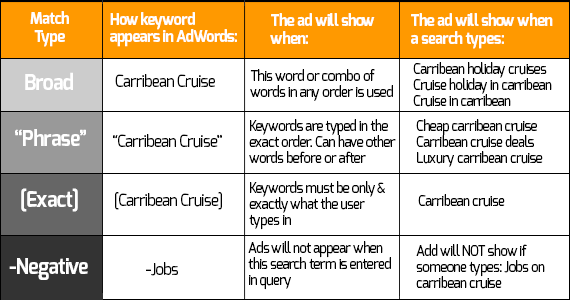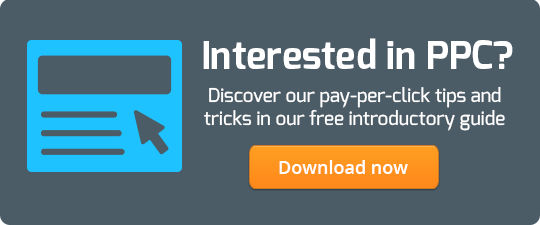Back to Basics: Which Keyword Match Type to Use in a PPC Campaign

When you start looking at your keyword options for Adwords, you'll discover that there are a few basic keyword types that you can use when choosing which searches trigger your ads. By picking the right match at the right time, you can better hit the audience that is going to get you the results that you want.

Go Broad or Go Home?
Google recommends that you start with broad keyword matches when you first begin your campaigns. The reasoning is that this gets you in front of the largest possible audience. However, it can also result in expensive campaigns that reach far beyond your best target audience. This can be a good strategy if you have not previously researched which keywords perform well, but, it can be a pricey way to find out. Study results closely and be ready to adapt quickly to focus more closely on the keyword type matches that give you the best results.
Narrowing it Down
To get a somewhat narrower search, you can use broad match modifier options. These will show close variations of your keyword, but will not show up for synonyms.
When you discover phrases that appear to have better than average conversion rates (this can depend on the industry, but you should be seeing AT LEAST at 2-3% conversion rate), add them to your keyword list. Then, narrow searches down to phrase matches or even exact matches. A strong list of keywords and a carefully honed campaign will result in your ad showing for fewer searches; however, the people who will see your ad are likely to be the ones who are the most qualified prospects.
When to Go Negative
Negative keywords give you even more control over who sees your ad. If you have studied your results and realized that people who search for "free reports" are not buying your services, try making "free" a negative keyword. This means that people searching that won't see your ad, saving you money on clicks that don't convert. You should also use negatives at the beginning of your search ad campaign to remove highly irrelevant traffic. For instance, if you only sell adult women's shoes, removing searches for children's shoes and girls shoes from the beginning will allow you to eliminate searchers who are looking for something different from your offerings.
It can take time to find the keywords that produce the best results on your search traffic. Try adjusting the focus while carefully studying which keywords result in the best conversions. We reccommend starting broad and using data to make educated adjustments. Over time, you will develop a powerful list that gets you the very best return on your search marketing investment.
Interested in learning more about PPC? Check out some of our other blog posts:

June 18, 2014

